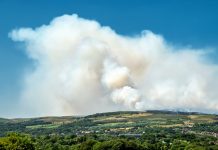At a time when plants could help solve global environmental problems, scientists warn we must become more in touch with botanical education
The lack of botanical education and knowledge has become a problem, exacerbated by schools and universities in the UK reducing their teaching of basic plant science, including plant identification and ecology.
Researchers describe the lack of public knowledge as a self-accelerating cycle which risks “…the extinction of botanical education,” where biology is taught predominantly by people with research interests in animal science.
The paper Botanical education extinction and the fall of plant awareness demonstrates the shortage of basic botany skills, which is hampering environmental improvements – such as the inappropriate planting of trees on peatbogs which can result in increased CO2 emissions by damaging these delicate habitats, or the various incidents of valuable wildflower meadows being threatened by careless tree planting or management.
“We ignore the opportunities presented to us by the botanical world at our own peril.”
Lacking valuable knowledge about botany and ecology leaves us with the ecological crises we are facing now in the time of climate change, which pose risks to health and safety.
Many postgraduate students in biological sciences lack basic plant identification skills
The researchers of the paper took an analysis of data from the Higher Education Statistics Agency revealing that botany, which was once a compulsory component of many university biology degrees and school programmes, which they now describe is “…now practically non-existent in the UK”.
Between 2007 and 2019, just one student graduated in the botanical sciences for every 185 students from the other bioscience disciplines.
In schools, the biology curriculum has focused on the energy flows through plant communities, plant reproduction and plant anatomy with little time given to ecology and no time to develop plant identification skills.

Valuable wildflower meadows being threatened by careless tree planting or management
The researchers argue that the lack of an ability to correctly identify plants could exacerbate the problem of the spread of invasive non-native plants, such as in the US, for example, where studies highlight that nearly two-thirds of species listed as invasive remain for sale – which hinders functioning ecosystems.
Seb Stroud, a PhD researcher in the Hassell Lab based in the School of Biology at the University of Leeds and lead author in the study, said: “The result of the decline in botany education is a reduced awareness of plants among the public and professionals alike.
“The result of that is that we are seeing environmental projects that are not just ineffective but adding to environmental problems. Harnessed properly, there is no doubt that plants could provide solutions to the looming climate and ecological crises of the 21st Century. We ignore the opportunities presented to us by the botanical world at our own peril.”
Nature literacy as a core skill for many professions
Fortunately, the Scottish Government noticed the lack of a skilled workforce to implement nature-based solutions and made a solution to include “nature literacy” as a core skill for various professionals, such as planners, engineers, architects and educators – who arguably need this botanical knowledge as much as much as farmers, foresters and fishermen do.
To reverse the decline of botanical education, the researchers call for an assessment of botanical education around the world and an analysis of the skill gaps among scientists and professionals in the environmental and plant sectors.
They also call for a campaign to raise plant awareness across higher education and in the public, to inform people about plants and engage them in botany.
In their conclusion, the research team note: “The extinction of botanical education will only continue to worsen unless we break the cycle of disconnection from the botanical world.”











